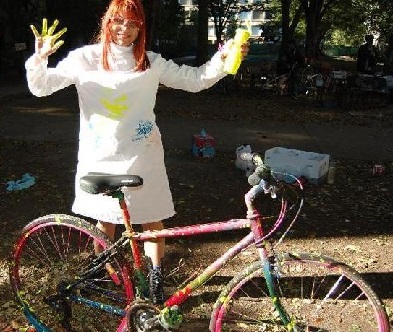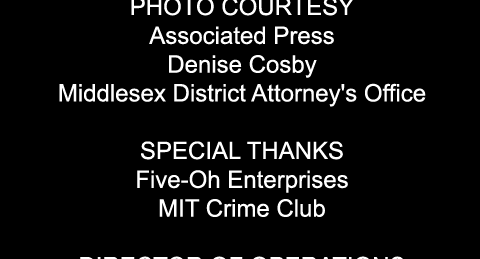
Jan 14, 2024
CrimeStoppers Tips from the club's 2010 Bicycle Theft Prevention Workshop in East Campus courtyard:

 "Trash up your shiny new bike frame. Apply a flat base coat with aerosol paint; then splatter with fluorescent tempera.... Clamp quick-release levers with hose clamps and duct tape."
"Trash up your shiny new bike frame. Apply a flat base coat with aerosol paint; then splatter with fluorescent tempera.... Clamp quick-release levers with hose clamps and duct tape."Which dorm won the club's 2008 Sparky the Fire Dog Award for Not Setting Off as Many Fire Alarms as Last Year?
Club members have published MIT and MIT–Harvard police log compilations in the Tech and the Cambridge Chronicle and rebroadcast Radio WIGGUM (MIT–Harvard police radio) online.
The Harvard Crime Club was organized by students "looking to MIT's Crime Club as an example."
Xi Yu, "CSI: Harvard," Flyby (blog), Harvard Crimson, January 30, 2010.
Members were known give away free saliva-alcohol test strips.
"Someone from the Crime Club … gave us kits to detect dangerous drugs in cocktails or determine somebody's blood alcohol level from their saliva. Ken was very happy, because as an ASA person he allocated money to the crime club."
Sam Maurer, "Marching Band Entry," Life & Culture (blog), MIT Admissions, November 1, 2005.
Findings: The Alco-Screen label instructions are incomprehensible to anyone who's over the limit.
FAIR Fund invited the club to nominate a candidate for its semiannual Dru Scholarship Award, supporting efforts by students to combat violence against women. Club member Brittan Smith (Harvard '09) shared a $1500 award for her work in making a drink-spiking test kit available to students at the College.
The Campus CrimeStoppers have been trying to find a personal-safety device that actually works. Club members determined that chemical sprays can be a bad idea if you're facing upwind; that whistles are universally ignored; and that tactical flashlights are almost effective — meaning, useless.
So they gave up and designed their own device, an optoacoustic "sonic flashlight," described in the project team's 2007 Venture Information Form. And Entrepreneurs Club director Richard Shyduroff invited that team to serve as a study case for MGMT SEM 089, Starting Up New Technology-Based Business Enterprises at MIT.
April 2010: Of Massachusetts’s twelve largest universities, MIT reports the highest theft rate.
University | Theft rate = (net value of property stolen) ÷ (10,000 degree-seeking students enrolled)
| MIT | $ 306,000 | ||
| Harvard | $ 156,000 | ||
| Boston Univ. | $ 97,000 | ||
| Northeastern | $ 71,000 | ||
| UMass–Amherst | $ 62,000 |
"Uniform Crime Reporting Record Card," 2008 & 2009, Supplement to Return A Master File (2009 & 2010); CJIS_COMM, email message to MIT Crime Club, 2011, appendix.
Update, June 2012. MIT hires five additional patrol officers!
Stolen-property data for MIT, Harvard, and BU police jurisdictions, 2006–14.
In fall 2011, Entrepreneurship Center judges selected club president Thea Koullias '13 as a top-ten contestant in the Products and Services track of the $100K Elevator Pitch Contest. She presented the club's idea for a stolen-property recovery service (discussed in its meeting Minutes).
In 2009 the club sent two P.I.s to investigate a murder scene at Harvard! In the credits for the "Brittany Smith and Jabrai Copney" episode of Snapped: Killer Couples, NBCUniversal thanks the club for its help:
"A Harvard student and a chart-topping music producer's secret criminal life is exposed when a botched drug deal leads to murder…"
For the authoritative version of that caper, see Jason Schwartz, "The Case of the Gumshoe Geeks: The Curious MIT Club That's Taken On a Murder Investigation as an Afterschool Project," Boston Magazine, August 2009.
For the pulp version, see Jessica Fargen, "MIT Kids Send Spies to Harvard," Boston Herald, June 3, 2009.
The Crime Club was organized in 2004/05 by Margeaux Randolph '04, Adaora Asala '04, and Shavonne Nyoka Hylton '05 and recognized as an MIT student group in April 2005.
"The founders of the MIT Crime Club are dedicated to improving general safety for MIT students, both on and off campus." Constitution (2005).
Harvard College students were also active members of the club. Former co-president Colleen Berryessa (Harvard '11) is now an assistant professor at Rutgers University's School of Criminal Justice.
